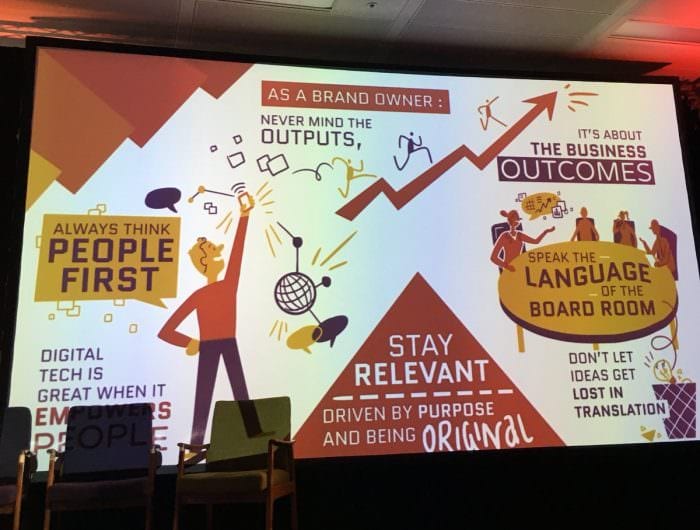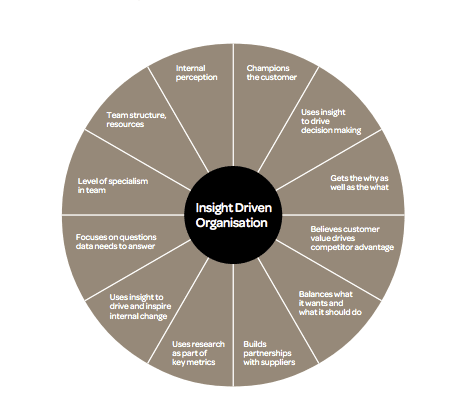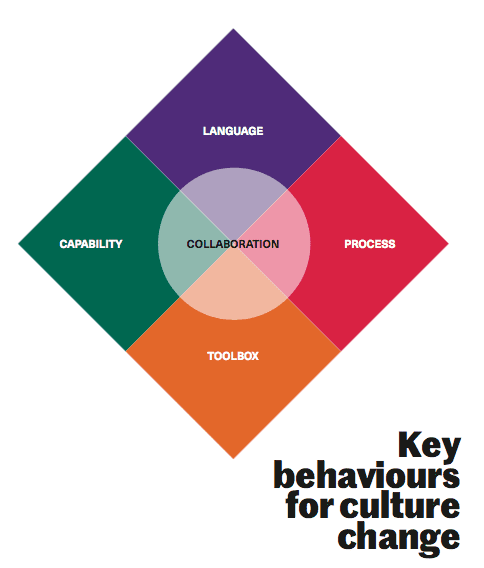Our summary of sessions from #Effweek: Using a more insight-driven approach for marketing

This week I attended the main session of the IPA-arranged #Effweek, which is aimed at sharing best practices on improving marketing effectiveness. In this article I'll cover the main themes, report on the new effectiveness research unveiled at the event and give examples from FMCG brands, financial services and telecoms of how effectiveness is managed.
The theme of the conference was how to use evidence-based decision-making in our marketing investments to improve value for our customers and business outcomes, particularly for media investments.
Now in its second year, the conference theme was closely linked to what we aim to support marketers in achieving through Smart Insights, i.e. harnessing marketing insight to make better decisions by moving from reporting to learning, which is nicely summarised by this Insight-driven marketing visual from the Marketing Research Society.

The increased complexity of marketing through digital channels and the risks of poor media investments meant that this wasn't an upbeat conference. Digital marketing opportunity and optimism has yielded to Digital marketing doubt and despair, particularly for brand advertisers. Indeed David Bond of the FT introducing the conference set the tone when we started as might be expected with the report you will likely have heard that P&G cut their digital ad spend by 100 million and nothing happened.... He also highlighted the challenges of lack of media transparency on placements and fraud.
In fact, behind the headline, the P&G story isn't simply about digital failing as a channel for this sector. Instead, it's about improving marketing effectiveness through smarter investment and learning. In reducing, not removing, its digital ad spend the company targeted ads served from sites with fake traffic from software known as “bots,” or those with objectionable content. Chief Executive David Taylor said in an interview that the digital spending cuts are part of a bigger push by the company to more quickly halt spending on items -- from ad campaigns to product development programs -- that aren’t working. This change in emphasis from reporting to empowering marketing teams to learn and improve was a recurring theme summarised by Fran Cassidy, author of the Culture F1rst report as these well-known improvement stages.
Plan > Do > Check > Adjust
The new #Culture F1rst research into marketing effectiveness
In this new Marketing Effectiveness research (download) from the Institute of Advertising Practitioners (IPA) the human dynamics of marketing effectiveness are reviewed by interviewing individuals working in Finance, Marketing and Analytics and Effectiveness units were interviewed alongside senior agency staff.

Some signs of businesses creating a culture of measurement from the research include ¾ of the 30 interviewees who have increased resource and ⅓ who have created specialist 'Effectiveness units' over the last three years. Fran talked about different models for structuring these units i.e. whether they are within Insight/Analytics or Finance or a combination.
The report stresses the importance of effectiveness as part of marketing capabilities and suggested these capabilities should be reviewed. Three groups were identified, based on sophistication, i.e.
- Basic. Simple reporting and review process
- More sophisticated. With brand tracking, ROI analysis and more use of econometrics and long-term use of insight for forward planning
- Data and insight changes. Not a capability level, but those in a smaller group who have just completed a complete insight and solutions change - in transition.
Brand health measures can be challenging with finance. But important when combined with customer experience data to improve the experience.
The report recommends these 5 success factors which are observed as more common in successful effectiveness cultures:
- Collaboration. Break down of silos, joint decision making on investment between marketing and brand and finance and commercial. Clarity on time to payback.
- Process. All organisations have a process, but this is about integrity, building in effectiveness at the start of investment decisions.
- Language. This is about using shared terms for effectiveness including measures and KPIs.
- Toolbox. This is the focus on the 'measures that matter'. By implication this is the different marketing technology and data sets too.
- Capability. This relates to staff skills to work on effectiveness. Cassidy noted that effective CMOs concentrate on improving capability, but a skills gap and staff churn. Responsibility and delivering on effectiveness need to be assessed and rewarded.
Agency capabilities are also important here as they can review client contact and reporting strategies; find the metrics that matter most across different timeframes; find the best language and marketing story to convey the importance of effectiveness; created cross-agency effectiveness hubs and deploy effectiveness based contracts and reviews
Marketing in the Digital Era - a financial services case study of effectiveness
This session was presented by Nigel Gilbert, Chief Marketing and Communications Officer, TSB. TSB Bank began operating as a separate business within Lloyds Banking Group in 2013.
He explained how marketing can show their value to the business from a CMO. Naturally, this has to be not focused on marketing activities, ads and technology, but about business outcomes. The role of marketing beyond ad investment is also important to communicate. He said"
"The brand is the customer experience and in the digital world, brand and overall customer experience are intertwined".
With the increasing importance of digital media, it's important to take inspiration from disruptors and innovators. He explained that he saw his role in developing the brand as "Creating an agile digital business that happens to be a bank'.
Turning to measurement he talked about how it's important to distinguish between Efficiency and Effectiveness across the whole of marketing. He sees effectiveness as proving what we have done. Performance is about what we can achieve in the future. Need to be clear which business metrics brand and marketing will affect business outcomes.
Effectiveness is performance across the whole business from business performance and outcomes. Brand is important as it represents the future and needs to be designed to be positive, sustainable and lasting.
In keeping with what others said, Mistakes = Learning, so organizations need a culture to encourage that. Always think people first, not platform, not technology first. This means they obsess over quality of experience and value offered.
As with the opening speaker, he also observed the trend that "Marketing is suffering a trust deficit". Trust is the big issue. Programmatic offered 'perfect targeting' but delivered misplaced ads. How did the big 5 lose trust? In the future he sees that AI and data can drive efficiency and speed, making these the biggest impact since the agricultural revolutions according to Stephen Fry.
Stay relevant, stay resonate and real. Need to purpose and original. How does what we create rate on the 'Give a Shitometer'. Particularly to get cut-through on social media.
In 2013, Mark Pritchard of P&G declared that Digital Marketing is Dead. He won't be the first and won't be the last. He recommending asking these three questions:
- How can you create a test and learn programme to rival effectiveness report
- How can the brand become something that accelerates development and growth
- How can we use every tool - digital and analogue to create value for our customers. Not that for shareholders
Marketing Effectiveness for FMCG Brands
In the next talk Adam Ben-Yousef , Global Marketing Effectiveness Director of Diageo, one of the world’s biggest marketing organizations, described his first year in the role, the brief he was set, how he is delivering on it, and what he is learning along the way.
He suggests that in his role the new incumbent should define
- The business purpose of marketing? He says "Marketing exists to create demand for your product". Simple. He believes this be founded on customer insight and research.
- Who makes the decisions on marketing investments? And what is the level of investment? There is a hierarchy of decisions and different 'actors' in most organizations. He believes businesses have to separate strategic from tactical from operational spend decisions. To build a marketing effectiveness culture, all 3 of these have to be covered.
- How are investment decisions being made and why? Diageo have used econometrics for some years, it wasn't cost-effective to scale-up since agency data review and consultants required. Too few of marketers understood results, or the levers they could pull day-by-day to influence them.
To improve this, They looked for a software-based solution 'Catalyst' that could be used by decision makers. Scalability and Sustainability. Needs to work across brands and markets of different scales.
At Diageo they wanted to build a 'Marketing Effectiveness' culture to ensure investment in the most effective media and support this by a tool: "Marketing Catalyst" which has been implemented in 19 markets alongside a strategic approach to measuring, testing, learning and adapting. Catalyst is described by Diageo as:
"This tool leverages internal and external data to perform econometric, return and other analysis so we can improve the allocation of spend across brands, marketing programs and media mix. While investment allocation has always been part of our annual planning process, this tool now gives us more granular insight into where investment will deliver the best returns enabling us to make bigger shifts with a greater level of confidence".
A strategic allocation module helps country teams where to invest. A growth driver module forecasts over 12 months based on consumer demand, response and ROI module based on econometrics.
- Finally, he gave his views on effectiveness culture 'must haves' :
Capability for managing effectiveness sits with decision-makers - not outsourced to creators of econometrics models or
- Consistent set of performance metrics that can be used worldwide - to become the language.
- Naturally fits into existing decision-making process
- Works everywhere (in markets and brands of different scale), not just within the lowest common denominator
- C-level buy-in Marketing, Finance, Sales and Overall.
Marketing effectiveness in telecoms
Jessica Salmon, Head of Insight at Telefónica UK also briefly explained how Marketing Effectiveness has developed as a discipline in O2. O2 see themselves as "a brand that runs a business, not a business with a brand".
The focus on effectiveness is part of a transformational journey at 02 to become more customer-led while proving the tangible value of this. They are now 3 years into the project of creating an evidence-based view by developing a marketing effectiveness function within Insights.
They have developed a capability in econometrics and use a Quarterly review process. Their aim is not just to take tactical short-term tactical decisions i.e. not just reacting, but make effectiveness part of longer-term strategies to build into 3-year plans.










